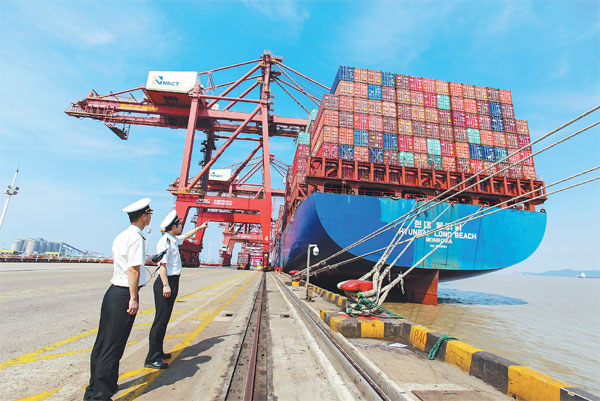Ningbo Customs helping Zhejiang cut down on counterfeits

Seizures of fake items intended for trade have increased over 30 percent
Ningbo Customs District of China in Zhejiang province places a strong emphasis on regulating management and fighting against intellectual property infringement, while seeking balance between effective IP protection and trade convenience.
The customs agency upholds those values in a bid to create a favorable business environment for international trade.
Since last January, the city's customs authorities have cracked down on 519 IP infringement cases, an increase of 30.7 percent year-on-year, and seized more than 12 million counterfeited goods worth about 610 million yuan ($90.87 million).

To better manage its exports, Ningbo Customs has strengthened actions during a four-month national campaign code-named Longteng. [Photo provided to China Daily]
With the implementation of China's innovation-driven development strategy, "Made in China" products have become more reputable and competitive in global markets. They also face a greater risk of being copycatted.
To better manage its exports, Ningbo Customs had strengthened actions during a four-month national campaign code-named Longteng, which started on August 1 of last year, to combat counterfeit goods in traditional industries such as machinery manufacturing, daily chemicals, food processing, textiles and electronic products.
The customs agency had also targeted counterfeit items in emerging sectors like energy conservation, environmental protection, telecommunication electronics, high-end equipment manufacturing and bio-medicine.
It took decisive measures to stop counterfeits from being exported to Africa, the Middle East, Latin America, Southeast Asia and the countries and regions involved in the Belt and Road Initiative to protect the reputation of China's national brands.
Huawei Technologies, one of China's telecoms giants, for example, has won affection among international consumers backed by its high-quality products and services. However, its success sparked a wave of fake products, produced by people looking to capitalize on its success.
In early April, the customs agency seized 1,310 counterfeit products bearing the Huawei trademark. They included mobile phone screens, cells and plastic stickers, and had a potential value of 113,000 yuan. The goods were intended to be exported to Papua New Guinea and Mozambique.
"Qualified lithium batteries must meet strict requirements for safety performance like charging protection, but these copycats have many potential security problems that will seriously affect users' health and safety," said Huang Ting, a senior official with Ningbo Customs.
MOST POPULAR
- 1 $39.7 billion worth of deals inked at Airshow China
- 2 China announces tax relief measures to stabilize real estate sector
- 3 A look at China's economy in October, 2024
- 4 Public holiday extension announced
- 5 China's NEV annual production hits 10 million milestone amid global carbon reduction efforts
Editors' Picks
 Infographic:
Golden jubilee of China-Brazil relations
Infographic:
Golden jubilee of China-Brazil relations
 Infographic:
A look at China's economy in October 2024
Infographic:
A look at China's economy in October 2024





